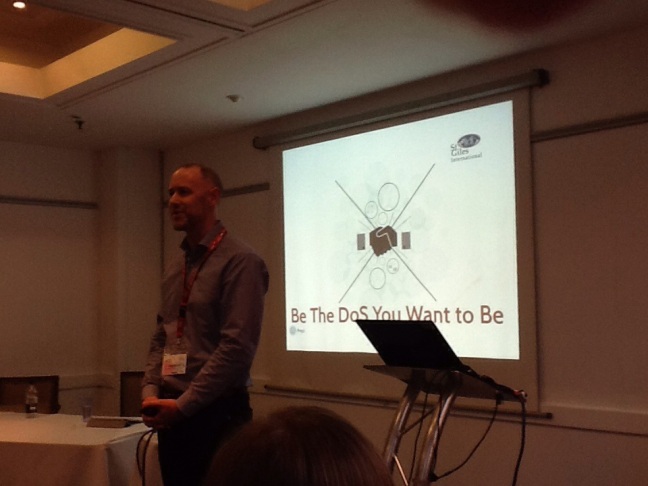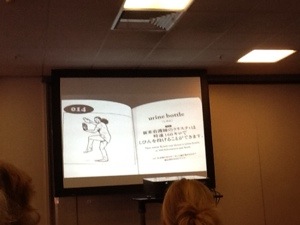This post appeared in my facebook news feed yesterday, and I immediately asked if Tereza would let me share it on my blog. In it, she questions the value of positive feedback.
Today I received my evaluation of the final project in my sports class and it motivated me for a little contemplation on one of the differences between American and Czech (or even European in this respect) culture. The task was to create my own workout and lead my classmates for the fraction of the lecture. Eventually, due to time reasons, it was ONLY 5 MINUTES. So basically, all I did was I came up with 6 exercises, explained and demonstrated them to my classmates and then we performed them for 40s each with 5s break in between. The whole time I commented into the microphone like ’15 seconds, almost there, you can do it!’ because that was one of the requirements. You can see my evaluation below. My teacher was SUPER impressed, I looked like a professional, I should be an instructor.

And here comes my point – really? I did not do anything impressive, I have never led a sport lecture before so I definitely have no motivation or other techniques developed and yet, based on 5 mins of doing stuff we have been doing in almost every class this semester, I should be an instructor! Americans are just always mega super trooper supportive to students, to kids, to each other, to everyone. Whatever you do, no matter how good or bad, it’s amazing. If you ask a question, however dumb one, teachers always start their answer with ‘That was an excellent question! I’m so glad you’re asking that.’ Whatever you do, it’s awesome, whatever you say, it’s so smart, whatever you wear, it looks cute and wonderful on you. One might think that there is everything perfect in America and everybody is talented and smart here. And that’s exactly mine (and not just mine) observation – people here really do think that. People are convinced that they are all brilliant at everything they do and look great in everything they wear. This might be a too big generalization, I admit. However, I can see evidence that it is mostly true every day.
My boyfriend teaches a calculus class at university in Missouri and his students, all future engineers by the way, are used to being praised their whole lives, getting excellent grades for everything and being told they can do everything and they are the best and the like as you could see on my evaluation. So those students are all shocked when they don’t get partial credit for accidentally guessing the right result, they are all surprised that there is someone who wants them to work hard for excellent grades and does not tell them ‘great job’ if the job is actually not that great. Instead of feeling ashamed they did not learn something or did not do the homework and therefore could not solve some exam problems, they go to him to complain, to accuse him that it is actually his fault they could not solve it and beg for extra points because they are used to always do great. Some time ago I posted here a ‘proof’ which one of my classmates did in a graduate-level math class. It almost made me cry, in short, she factored ‘x’ out of the integral which depended on ‘x’, they would not have let me finish high school if I had done that in the Czech Republic. So this girl still happily attends the class and I got the honor to read one of her papers we had to turn it. It was a complete disaster, she copied every single thing from the paper which it was based on, she not just copied it but also made a lot of mistakes in copying it, her sentences did not make sense, you could not call her proofs ‘proofs’ even if you were drunk and for all that she got 15 points out of 20. I wouldn’t give her even 10. However, that might probably touch her self-esteem and that’s not desired here.
I am not saying that being supportive and appreciating someone is bad. Especially with kids you should do that a lot. However, here it is led to extreme and moreover, college students are not kids anymore. Or at least they should not be. I have already lost the sense of what is meant honestly and what is just ‘American-like’. I basically have no measure whether I did well or bad because I always get a perfect evaluation. You have no idea whether people like you or how high they think of you because they always say you did a fantastic job. At the beginning, it makes you feel good, like you are really special, you do really so well. But with time, you get tired of that because you already see through it. Again, don’t get me wrong, I do not think teachers should be harsh on students, it is good to give someone encouragement and ‘push’ but not the fake one. In the Czech Republic or Germany where I got a chance to study, or even in my family, we do not flatter each other all the time. I know my parents love me and are proud of me but they do not tell me how amazing and talented and extraordinary I am every time I do something. Therefore, when they do tell me that, when they appreciate something I achieved or succeeded in, I can be sure they mean it and I value it very much then.
Tereza Eliášová is from the Czech Republic, and is currently studying for a semester in the United States. She was one of my students in Brno.




 , page 53, Unit 6C
, page 53, Unit 6C







































